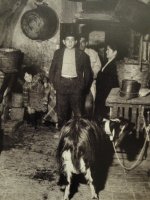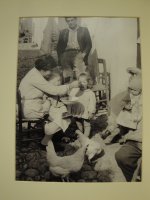What I learned at the Matera Women’s Fiction Festival – Part 2
 I’ve already mentioned much of what I learned at this year’s Matera Women’s Fiction Festival in Part 1.
I’ve already mentioned much of what I learned at this year’s Matera Women’s Fiction Festival in Part 1.
In that post, I covered issues related to electronic publishing, the newly-coined term ‘dicoverability’, and the role of agents today in a quickly-shifting marketplace.
 But just to prove all my time wasn’t spent wandering the steep and winding streets of Matera’s lovely cave district or seeking refreshment in one of the town’s many picturesque restaurants, here’s part 2 of what I learned about the rapidly changing publishing industry.
But just to prove all my time wasn’t spent wandering the steep and winding streets of Matera’s lovely cave district or seeking refreshment in one of the town’s many picturesque restaurants, here’s part 2 of what I learned about the rapidly changing publishing industry.
The Women’s Fiction genre – “When women stop reading, the novel will be dead.”
 The panelists agreed that British novelist Ian McEwan’s words paint an accurate portrait of today’s reading public: from young adult to mainstream adult fiction, women simply read more than men. Although most of the bosses are men, most of those employed by the publishing industry are women. And a whopping 95% of blogs dedicated to books and literature are authored by – you guessed it – women.
The panelists agreed that British novelist Ian McEwan’s words paint an accurate portrait of today’s reading public: from young adult to mainstream adult fiction, women simply read more than men. Although most of the bosses are men, most of those employed by the publishing industry are women. And a whopping 95% of blogs dedicated to books and literature are authored by – you guessed it – women.
And yet, male authors garner more respect. There’s been much debate recently that they receive a disproportionate amount of reviews in mainstream press, that their works are considered literature with a capital L, while women exploring similar themes are often relegated to a much lower rung on the ladder. At the risk of sounding flippant, I’m guessing women working in many sectors will find this a fairly familiar pattern, and not just relegated to the publishing world.
There has even been discussion about whether female authors should reject the term women’s fiction – a rather broad title that covers many genres and generally tends to be written for a primarily female audience, with a female protagonist, and addressing issues of interest to female readers. After all, there’s no ‘men’s fiction’, goes the argument.
I appreciated the observations of Isabella Spanu, of Italian publishing house Leggereditore , when she said “If these differences [between women’s fiction and general fiction] exist, we should embrace them and use them to our advantage.” I agree with this. Women are the majority of the reading public.
 Women like reading stories with female protagonists overcoming difficulties and growing as individuals. If men read the novels, great. But I think we should concentrate our efforts on the large, enthusiastic female reading public that already exists, promote our fellow female authors, and stop making apologies for writing the kinds of books that the majority of the reading public is eager to read.
Women like reading stories with female protagonists overcoming difficulties and growing as individuals. If men read the novels, great. But I think we should concentrate our efforts on the large, enthusiastic female reading public that already exists, promote our fellow female authors, and stop making apologies for writing the kinds of books that the majority of the reading public is eager to read.
The importance of social media – French publisher Stéphane Marsan cited a recent study in France that showed that readers intrigued by a book and its author, most often said that they wondered if the author would be someone with whom they would like to sit down and have a glass of wine and a chat.

Mural detail of the poverty of Matera’s sassi district by Carlo Levi, Italian artist and author of ‘Christ Stopped at Eboli’ (Palazzo Lanfranchi)
This is the type of experience social media can replicate. Young adult author and social media expert Beth Barany spoke to us about the importance of social media for authors seeking to share information and build relationships. Specifically, Beth discussed Twitter with us, highlighting the benefits of building communities, connecting with other authors, and promoting one another’s work.
While I’m not a fan of Facebook, I do see the benefits of Twitter. One of these days, I may even getting around to using it…
Brainstorming- Okay, this was a real discovery! Last year, I didn’t sign up for this, so this year I made up for lost time by attending both sessions. Although I’m in two writing groups, I’ve never done group brainstorming before, and it’s truly useful.
Jane Correy, an English author who writes in several genres in multiple pen names, walked us through the session and offered us helpful tips and advice.
 Authors raised problems they were facing in their books – characters who were flat, a problem that wasn’t resolving itself, the need to introduce more tension. You name it, we discussed it. And it really is helpful to get a group of authors, writing in a variety of genres, just throwing ideas out and trying to help resolve the author’s problems.
Authors raised problems they were facing in their books – characters who were flat, a problem that wasn’t resolving itself, the need to introduce more tension. You name it, we discussed it. And it really is helpful to get a group of authors, writing in a variety of genres, just throwing ideas out and trying to help resolve the author’s problems.
Perhaps books can’t be written my committee, but plot holes can certainly be hammered out in group work. This is something I’d love to do more of. Maybe some of you already do this in your writing groups? If so, I’d love to hear your experiences…
There’s obviously lots more that we discussed during our sessions, but I think I raised the main points that may be of interest to other writers. But it you’re really eager to learn more… just join me at next year’s conference.
See you next September in Matera!



I will definitely be seeing you there next year! I agree with Spanu’s point that we should embrace our subject matter or at least not make excuses for it. I’ve heard many a comment speaking about ‘women’s fiction’ being a lesser form of expression – even V.S. Naipaul put in his five cents’s worth last year. While I think it’s important to disagree with such outright sexism, the figures do the talking : without women readers, not even male writers can survive.
Very interesting that Hilary Mantel has won her second Booker while writing about what might be perceived as a ‘man’s’ topic. Great post!
Thanks, Catherine… already look forward to seeing you next year. Agreed that from a marketing perspective alone, it would be better for an author to bite his tongue rather than let such remarks slip out. But then again, even prime ministers seem to have to put up with more than their fair share, : ) so why not authors, too?
Sounds like you had an awesome conference! I agree that women should embrace “women’s fiction” as a label. It lets women know what they want to read. Since women read so much, go for it! I’m not ashamed to label my books “romance” and you can guess how many men will pick it up.
Group brain storming is a lovely idea! I’ve done this by email a few times if I have a problem. I’ll send it out to whichever crit partners have read that and let them throw me some ideas. I bet we could do this in a forum on CC though!
Thanks for sharing, Kimberly! And I am jealous of all that exploring you got to do around the town too! 😉
Thanks, Chantel! Yes, the romance genre was discussed a lot in this conference. Harlequin Italy is one of the conference sponsors. And it’s one of the strongest genres in all the markets represented (US, Italy, Germany, France) and one in which the digital market is quite strong, even in countries with weak e-book markets. So It seems there are lots of opportunities for romance writers in today’s market – that’s good news for you!
Twitter! Twitter! Twitter! Come on… you can do it. 🙂
Love hearing about the conference. What wonderful topics. I’ve also read forums about the term “Women’s Fiction” and I find it interesting. Wish I could fly across the world to attend next year. 🙁
Thanks, Mindy! Still hope you’ll be there next year launching the Italian version of your book. Matera’s just a hop, skip, and a jump from Guatemala, after all. : ) Yes, one of these days I will join Twitter. But right now, I have too many distractions from my writing. Know what I mean?
What a great post, Kimberly. There are many interesting points to spark a discussion. You mention that bosses are more likely to be male. I wonder why. I would love to visit that place one day. Women’s fiction is a vast writing “field”. I think this post is encouraging. Lovely paintings.
Thanks, Julia. Yes, the industry is changing so rapidly that I think many points were raised that sparked interesting discussion. I certainly learned a lot (and still have much more to learn…) The point about the publishing industry being overwhelmingly female, except for the upper management, was expressed by all panelists – male and female, US and European, alike. But as the overwhelming majority of the reading public is made of women, I think there are tremendous opportunities for women writers now.
Yes, I was happy to see this Carlo Levi mural on my first visit to Matera. If you haven’t read his book, ‘Christ Stopped at Eboli’, you may want to one day. It’s an amazing work looking at the poverty of southern Italy. Hoping to see you here one day! : )
Sounds like such a great conference. Wish I was there. I’m on FB but just use it mostly for friends, as for twitter, I just don’t get it. But maybe one day I will. Once again, thanks for the great info.
Thanks, Janet. It really is a great conference – and just so inspiring to be among so many creative women and learning from their experiences. Maybe I’ll see you there one September! I agree with you – one day I may “get” all these social media tools… but right now I feel like I have my hands full and hardly need more distractions from writing! : )
Sorry we didn’t met in Matera! I was at WFF too… Maybe next year… Women Fiction Festival is always a great experience. Can’t wait to be there next september… Thanks for sharing your days in Matera with your post…
Oooh, Giulia, sorry to have missed meeting you at Matera. And I hope to make up for this error next September! I agree with you. I think it’s a really positive experience and I really come back with new energy for writing. Ci vediamo la prossima volta!